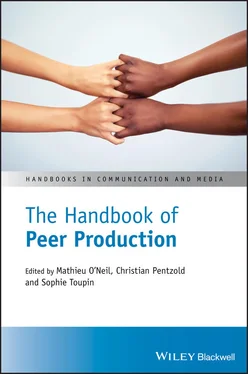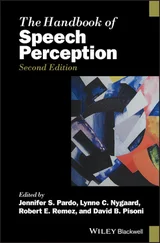1 Cover
2 Title Page The Handbook of Peer Production Edited by Mathieu O’Neil Christian Pentzold Sophie Toupin
3 Copyright Page
4 List of Figures
5 List of Tables
6 Notes on Contributors
7 Preface
8 Chapter SummariesPart I Introduction Part II Concepts: Explaining Peer Production Part III Conditions: Enabling Peer Production Part IV Cases: Realizing Peer Production Part V Conflicts: Peer Production and the World Part VI Conversions: Advancing Peer Production
9 Part I: Introduction 1 The Duality of Peer Production 1 Introduction 2 Peer‐to‐Peer Infrastructure 3 The Exclusive Attraction of Commons‐Based Peer Production 4 The Digital Commons and Capitalist Production 5 The Handbook of Peer Production Aims to be Inclusive and Political References
10 Part II: Concepts: Explaining Peer Production 2 Grammar of Peer Production 1 Introduction 2 Peer‐to‐Peer 3 Principles and Characteristics of Peer Production 4 Entities of a New Commons‐Based Ecosystem 5 The Transcendent Aspects of Peer Production 6 Instead of Conclusions: Towards a P2P Theory Acknowledgments References 3 Political Economy of Peer Production 1 Introduction 2 Transformation of Capitalism in the 20th Century 3 Response to the Crisis of the 1970s 4 The Transformation of the Internet and Web‐Based Business Models 5 The Commons as Alternatives 6 Concluding Remarks References 4 Social Norms and Rules in Peer Production 1 Introduction 2 Why Rules and Norms? Institutional Conditions for Peer Production 3 What Rules and Norms? Policies, Guidelines, and Basic Understandings in Peer Production 4 How to Create Rules and Norms? Institutional Work in Peer Production 5 Whither Rules and Norms? Governance, Hierarchies, and Bureaucracy in Peer Production 6 Conclusion References 5 Cultures of Peer Production 1 Introduction: Peer Production as Cultural Production 2 Overview and Limitations 3 Autonomy 4 Meritocracy 5 Openness 6 Inspiration 7 Conclusion Acknowledgments References 6 Commons‐Based Peer Production and Virtue (reprint) I Commons‐Based Peer Production – Examples II Commons‐Based Peer Production – Principles III Commons‐Based Peer Production and Virtue IV From Structure to Virtue V Public Policy VI Conclusion
11 Part III: Conditions: Enabling Peer Production 7 Prophets and Advocates of Peer Production 1 Introduction: A New Specter is Haunting the World 2 Before 2000: A Period of Gestation 3 2000s: Emergence of Peer Production Theory 4 Post‐2010: Peer Production Theory Moves into the Mainstream 5 Conclusion: What is the Impact of Peer Production Theory Today? 6 Acknowledgments References 8 Virtue, Efficiency, and the Sharing Economy 1 Introduction 2 Commons‐Based Peer Production and Adjacent Practices 3 Participation, Collaboration and the Rhetorical Dimensions of Network Culture 4 Utopian Thinking and Copyright Conflicts 5 Conclusion References 9 Open Licensing Peer Production 1 Introduction 2 Free, Libre, and Open Source Software Licenses 3 Open Licenses for Cultural Works 4 Open Licenses for Functional Works 5 Developments in Open Licensing 6 Conclusion References 10 User Motivations in Peer Production 1 Introduction 2 Individual Motivation 3 Choosing a Task to Work On 4 Peer Production as a Social Practice 5 Conclusion References 11 Governing for Growth in Scope 1 Introduction 2 Case Analysis 3 Scope of the Innovation LifeCycle 4 Governance Rights 5 Patterns of Growth 6 Advancing a Research Agenda References
12 Part IV: Cases: Realizing Peer Production 12 Free and Open Source Software 1 Introduction 2 Genesis of a Movement 3 How it Works: The Economy and Sociology of Free and Open Source Software 4 Beyond Experimentation: Mainstream Adoption and Social Significance 5 Challenges 6 Conclusion References 13 Wikipedia and Wikis 1 Introduction 2 The Wiki Platform 3 Wikipedia: Background and History 4 Wikipedia and its Contributors 5 Wikipedia and Its Content 6 The Wikipedia Community 7 Wikipedia and the Role of Experts 8 Wikipedia and the Media Ecology 9 Conclusion References 14 Participatory Cartography 1 Introduction: New Materialism and the Technologies of Hacker Cartography 2 Technological Power 3 OpenStreetMap 4 Global Positioning System 5 DIY Drones and 3D Robotics 6 Countermapping in Indonesia 7 Conclusion References 15 P2P Learning 1 Introduction 2 Curriculum Selection 3 Learning Process 4 Knowledge Abstraction 5 Learning Infrastructures 6 Conclusion Acknowledgments References 16 Biohacking 1 Introduction 2 History 3 Practices and Identities 4 Examples of DIY Medicine 5 Openness and Democratization 6 A Sociology of the “yourself” 7 Ethics and Governance 8 Economics and Valuation 9 Conclusion References 17 Makers 1 Introduction 2 A Short and Incomplete History of Making 3 Defining Making: Words Matter 4 Empowerment and Emancipation: Users Becoming Makers 5 Maker Communities and the “Movement” 6 Discussion and Conclusion References 18 Blockchain, or, Peer Production Without Guarantees 1 Introduction 2 Coase’s Benkler 3 Coordination Issues 4 Peer Production After Bitcoin 5 Peer Production 6 Peer Development 7 Peer Governance 8 Peer Exchange 9 Conclusion References 19 Community Wireless Networks 1 Introduction 2 Design and Social History of Community Broadband Projects 3 Motivations for Deploying Community WiFi Networks 4 Technological Innovation 5 Conclusion References 20 Commoning the Urban 1 Introduction 2 Urban Commons: A Sociospatial Identity 3 Urban Commons: A Political and Cultural Identity 4 Bottom‐Up vs. Top‐Down, Artists and Architects Initiatives 5 Commoning the Urban: Trends, Gaps, and Opportunities 6 Possible Futures References
13 Part V: Conflicts: Peer Production and the World 21 Peer Production and Social Change 1 Introduction 2 Self‐Governance Outside the Political System: Prefigurative Politics 3 Self‐Governance and Engagement in Electoral Politics 4 The Economics of the Commons and Labor 5 Conclusion: Towards a Sustainable Contribution Society? References 22 Peer Production and Collective Action 1 Introduction 2 Peer Production in Context: A Brief History 3 Enabling Infrastructure and its Social Affordances 4 The Consequences of Peer Production for Collective Action 5 Three Unresolved Tensions 6 Conclusions References 23 Feminist Peer Production 1 Introduction 2 Feminist Peer Production as Situated Knowledge 3 Three Case Studies References 24 Postcolonial Peer Production 1 Introduction 2 A Brief History of PCPP: An Indian Perspective 3 Traditions of Popular Knowledge 4 Money and Creativity in PCPP 5 The Organizational Structure of PCPP 6 Conclusion References 25 Gaps in Peer Design 1 Introduction 2 Faroo, or the Socio‐Economic Implications of a Peer Design Choice 3 Wuala, or Ultimately Renouncing Peer Design 4 Conclusions References 26 Makerspaces and Peer Production 1 Introduction 2 Spaces of Possibility 3 Spaces of Tension 4 Spaces for Post‐Automation? 5 Spaces of Liberation? 6 Conclusion References 27 Peer Production and State Theory 1 Introduction 2 With or Without the State: Peer Production from the Economic Sphere to the Political, and Back Again 3 On the (Partner) State as Agency for Social Transformation 4 On Cooperatives as Vehicles of Economic and Political Agency 5 From Counter‐Power to Social Reform: The Partner State in Motion 6 Conclusion References
14 Part VI: Conversions: Advancing Peer Production 28 Making a Case for Peer ProductionInterview with Peter Bloom, Founder of Rhizomatica, Oaxaca, Mexico, 21 February 2019 Interview with Mariam Mecky, Communications Unit Head at HarassMap, Cairo, Egypt, March 13, 2019 Interview with Ory Okolloh, Co‐founder of Ushahidi, Director of Investments at Omidyar Network, Johannesburg, South Africa, 17 June 2019 Interview with Abraham Taherivand, Executive Director of Wikimedia Deutschland, Berlin, Germany, 18 March 2019 Interview with Stefano Zacchiroli, former Debian Project Leader, 17 June 2019 References 29 What’s Next? 1 Introduction 2 Peer Production and Productivity 3 Peer Production and Social Justice 4 Do We Need Peer Production Studies? References 30 Be Your Own Peer! Foreword 1 Introduction 2 Kicking It to the Next Level: Strategic Principles 3 Calling All Peers: Practical Proposals 4 Conclusion References
Читать дальше


![О Генри - Справочник Гименея [The Handbook of Hymen]](/books/407356/o-genri-spravochnik-gimeneya-the-handbook-of-hymen-thumb.webp)









